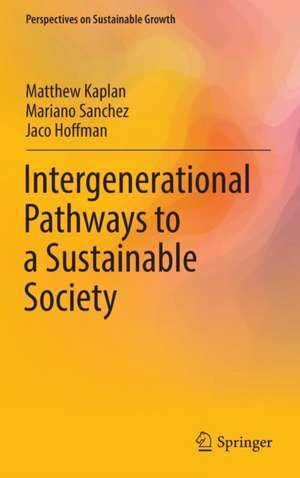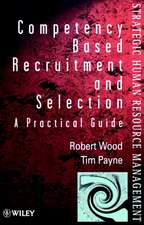Intergenerational Pathways to a Sustainable Society: Perspectives on Sustainable Growth
Autor Matthew Kaplan, Mariano Sanchez, Jaco Hoffmanen Limba Engleză Hardback – 16 dec 2016
For societies to be sustainable, all generations must coexist at any given time and across time (non-contemporary generations). Hence, the ultimate vision presented here is one of intergenerational sustainability as both a conceptual tool and as a call for action. Intergenerational pathways are introduced as strategies for improving health and well-being across the lifespan, strengthening families, improving under-performing educational and work-related systems, and helping to build more cohesive, caring communities.
Reviewing some of the historical factors and developments influencing intergenerational studies, as well as presenting regional case studies and comparative research, this book presents successful models that may be applied to everyday multigenerational practices in institutions such as education, family life, housing, healthcare, employment, and community development. The result is an accessible resource for students, academics, policymakers, community leaders, and citizens concerned with creating opportunities amidst challenging demographic and social changes.
| Toate formatele și edițiile | Preț | Express |
|---|---|---|
| Paperback (1) | 940.57 lei 43-57 zile | |
| Springer International Publishing – 30 apr 2018 | 940.57 lei 43-57 zile | |
| Hardback (1) | 946.55 lei 43-57 zile | |
| Springer International Publishing – 16 dec 2016 | 946.55 lei 43-57 zile |
Preț: 946.55 lei
Preț vechi: 1154.34 lei
-18% Nou
Puncte Express: 1420
Preț estimativ în valută:
181.12€ • 189.61$ • 149.87£
181.12€ • 189.61$ • 149.87£
Carte tipărită la comandă
Livrare economică 07-21 aprilie
Preluare comenzi: 021 569.72.76
Specificații
ISBN-13: 9783319470177
ISBN-10: 3319470175
Pagini: 231
Ilustrații: XVIII, 192 p. 14 illus., 10 illus. in color.
Dimensiuni: 155 x 235 x 13 mm
Greutate: 0.48 kg
Ediția:1st ed. 2017
Editura: Springer International Publishing
Colecția Springer
Seria Perspectives on Sustainable Growth
Locul publicării:Cham, Switzerland
ISBN-10: 3319470175
Pagini: 231
Ilustrații: XVIII, 192 p. 14 illus., 10 illus. in color.
Dimensiuni: 155 x 235 x 13 mm
Greutate: 0.48 kg
Ediția:1st ed. 2017
Editura: Springer International Publishing
Colecția Springer
Seria Perspectives on Sustainable Growth
Locul publicării:Cham, Switzerland
Cuprins
Chapter 1 Introduction.- Chapter 2 Intergenerational Approaches for Sustaining Physical and Mental Health.- Chapter 3 Intergenerational Strategies for Sustaining Families and Family Life.- Chapter 4 Intergenerational Strategies for Promoting Lifelong Learning.- Chapter 5 Intergenerational Strategies for Sustaining Strong Communities.- Chapter 6 Intergenerational Strategies for Establishing Sustainable Work Environments and Work-Family Balance.- Chapter 7 Conclusions.
Textul de pe ultima copertă
This volume explores intergenerational practices and their impact on social sustainability, with an emphasis on developing programmatic efforts to address profound social challenges such as underperforming educational and work-related systems, failing support systems for dependent or vulnerable populations, and community renewal and regeneration efforts. To this end, the core argument is to present issues related to age, aging, and generations, not only as problems, but as catalysts to facilitate improved quality of life for all generations.
For societies to be sustainable, all generations must coexist at any given time and across time (non-contemporary generations). Hence, the ultimate vision presented here is one of intergenerational sustainability as both a conceptual tool and as a call for action. Intergenerational pathways are introduced as strategies for improving health and well-being across the lifespan, strengthening families, improving under-performing educational and work-related systems, and helping to build more cohesive, caring communities.
Reviewing some of the historical factors and developments influencing intergenerational studies, as well as presenting regional case studies and comparative research, this book presents successful models that may be applied to everyday multigenerational practices in institutions such as education, family life, housing, healthcare, employment, and community development. The result is an accessible resource for students, academics, policymakers, community leaders, and citizens concerned with creating opportunities amidst challenging demographic and social changes.
For societies to be sustainable, all generations must coexist at any given time and across time (non-contemporary generations). Hence, the ultimate vision presented here is one of intergenerational sustainability as both a conceptual tool and as a call for action. Intergenerational pathways are introduced as strategies for improving health and well-being across the lifespan, strengthening families, improving under-performing educational and work-related systems, and helping to build more cohesive, caring communities.
Reviewing some of the historical factors and developments influencing intergenerational studies, as well as presenting regional case studies and comparative research, this book presents successful models that may be applied to everyday multigenerational practices in institutions such as education, family life, housing, healthcare, employment, and community development. The result is an accessible resource for students, academics, policymakers, community leaders, and citizens concerned with creating opportunities amidst challenging demographic and social changes.
Caracteristici
Highlights potential contributions of intergenerational practice to health and well-being, education, work policies, family, etc. Presents major intergenerational theories and research studies from a wide range of settings and objectives Presents basic themes that are seemingly “universal” across geographic regions and cultural contexts Includes regional case studies, applications, models and approaches














